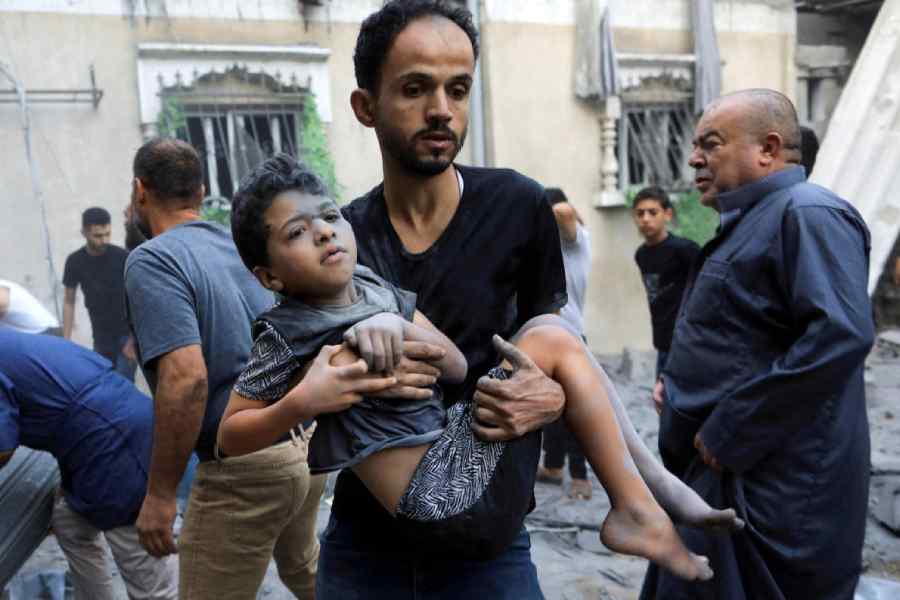The G20 leaders’ communiqué’s confident assertion that “Today’s era must not be of war” has been belied by the reassertion of neighbourhood fault lines. Old conflicts are not like old soldiers since they seldom quietly fade away on their own. Even as the ongoing war of attrition in Ukraine continues, two old geopolitical fractures have erupted with an intensity that surprised many.
The Hamas attack on Israel from Gaza on October 7 displaced the Ukraine war from the headlines principally because of its scale and audacity and perhaps even more because of the chinks it exposed in Israel’s security grid. It is a truism that no counter-terrorism grid is immune to breaches. But that the Israelis would be caught off guard so comprehensively also revealed how deceptive exaggerated narratives of the robustness of security capacities can be. The Israeli historian, David Shulman, wrote after these attacks of the failure of “[a]n entire conceptual system that has dominated Israeli thinking and also government policy for the last several decades...”
In all discussions of the Hamas terrorist outrage — any attack on civilians is just that — the Israeli intelligence failure, therefore, figures largely. Yet, alongside this, there is, inevitably, a larger political failure of disregarding and presuming to be settled a deep and festering sore in the region Israel is part of. The advances in relations with major Arab countries through the Abraham Accords and the even more recent promising signs in Saudi-Israel relations could well leave the impression that Israel’s interface with the Palestinian issue no longer has the relevance and the resonance that it once did in West Asia as a whole. These attacks from Gaza demonstrate that fault lines and fractures rarely just melt away.
The Hamas attacks, which caught Israel so completely off guard, evoke the memory of what happened almost exactly 50 years ago — the October 1973 Yom Kippur War when coordinated thrusts by the Egyptian and the Syrian armies had initially outsmarted Israel’s military. To some, this coincidence with October 1973 makes the latest Hamas attacks Israel’s ‘new’ Yom Kippur. To others, there is an even more recent parallel: the attacks constitute Israel’s 9/11 moment. Whatever comparative imagery is employed, the fact is that the events of this October will cast a prolonged shadow to our west.
However, this was not the only eruption of a recognised and long-simmering fault line. In the Caucasus, Azerbaijan forces overran the enclave of Nagorno-Karabakh, formally a part of Azerbaijan but largely inhabited by ethnic Armenians. Over a few days, in the second half of September, the Armenian population was driven out and the character of this territory irreversibly changed by wholesale, old-fashioned, ethnic cleansing.
The roots of this history point in different directions. To many Armenians, their fate in Nagorno-Karabakh evokes memories of the early-20th-century genocide of Armenians in the Ottoman Empire. The principal actors this time were Azeris and not the Ottomans or the Turks. But Azerbaijan’s proximity to Turkey is close enough for the parallel to be drawn with some justification. Yet another part of this history lies in the constitution of the Soviet Union where different ethnicities were welded together with the confidence that the strength of the whole structure would keep ethno-nationalism in check. Although Armenian in ethnicity, Nagorno-Karabakh fell within Azerbaijan notwithstanding Armenia’s request that it be incorporated within its borders.
As the Soviet Union came apart and Azerbaijan and Armenia became separate and competing nations, the situation changed. In the past three decades, conflict and attempts to find some manner of compromise have characterised the history of Nagorno-Karabakh.
In the 1990s, Armenia and the Armenians in Nagorno-Karabakh dominated the interface with Azerbaijan. That balance gradually shifted in the other direction and since 2020, the military balance has been in Azerbaijan’s favour. Armenia may well certainly regret its triumphalism in the early 1990s because a more sustainable understanding with Azerbaijan then may well have stabilised the situation. Whether the Caucasus will now be more stable is a different question altogether. One-sided outcomes usually carry within them the seeds of their erosion.
The scale of violence in these two episodes is not comparable; neither are their wider implications. The extinction of the Armenian enclave was relatively less violent than expected. The Hamas attacks and the retribution and vengeance that now constitute the Israeli response are in a different league. The potential impact on the price of hydrocarbons that a major conflict in West Asia has also elevates the conflict in Gaza to a different level. For India, with large numbers of its nationals living and working in the Gulf, any instability in the region is a major concern.
The developments in Gaza and in Nagorno-Karabakh have an impact on two India-related initiatives. The North-South Transport Corridor from India to Russia via Iran traverses the Caucasus. Already burdened by the sanctions on Iran and Russia by the United States of America, instability in the Caucasus will further diminish the Corridor’s prospects as a viable transportation network. Similarly, the India-Middle East-Europe Corridor announced with much fanfare only last month relies on stability in the region. How the Hamas attack and Israel’s counter-measures will impact the broader politics of the Middle East is hard to predict.
But the real takeaway for us in India has to be that neighbourhood contestations and regional conflicts would continue to be dominant and retain their priority and agency. The space they occupy is not going to diminish because of the growth of different and new meta-narratives that dominate our mental make-up. Thus, both in the Caucasus and in West Asia, it is not the US-China contestation that has determined events. Perhaps even more important is the takeaway that old fault lines should be attended to rather than left alone with the expectation that we have graduated beyond them. History does not work that way.
T.C.A. Raghavan is a former Indian High Commissioner to Singapore and Pakistan










